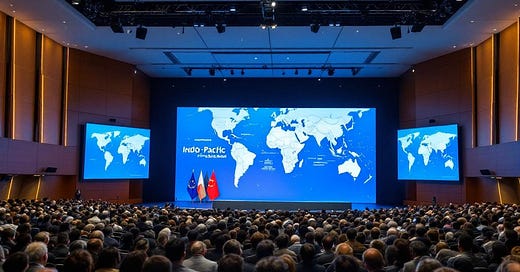Europe and the Indo-Pacific: takeaways from the Shangri-La Dialogue
2 June 2025
The annual Shangri-La Dialogue, Southeast Asia’s flagship conference on security, defence, and geopolitics in the region, took place in Singapore last weekend. Organised by the International Institute for Strategic Studies, the conference gathers high-level politicians, business representatives, and experts to address the most pressing international and regional challenges. It is therefore a major forum for political leaders to lay out their visions for the region and beyond.
As the Indo-Pacific has been gaining importance in European security and defence, and more broadly in European geopolitical thinking, over the last few years, European leaders were also present at the conference. That is why this edition of the Geopolitical Europe Pulse brings you a short recap of the key ideas and themes from the speeches by French President Emmanuel Macron and EU High Representative Kaja Kallas, and how they have to be understood in the context of current international politics.
French President Emmanuel Macron opened this year’s Shangri-La Dialogue with the keynote address. After another major speech at the annual Raisina Dialogue in March — a similar dialogue format held in New Delhi —, the French president used the speech to emphasise the importance of cooperation in a time of “a risk of division of the world and division between the two superpowers”. The key themes of the speech were:
Double standards: Macron criticised double standards as an increasing trend in international politics, namely in Ukraine, where states remain equidistant between Russia and Ukraine without condemning Russia’s violation of Ukraine’s territorial integrity and sovereignty, and Gaza, where “a lot of the Americans and the Europeans are, in fact, giving a free pass to Israel”. He applied the same idea of double standards to rich countries which stop investing in the global sustainability or health agenda.
The risk of division of the world into spheres of influence and a division of the superpowers: The theme of a division of the world was omnipresent in Macron’s speech; instead of “spheres of influence”, the French President referred to “spheres of coercion”, and stated that the way to escape this trend was to build broader coalitions focusing on the respect of international law.
The need for building a “coalition of the independent”: In light of the increasing tensions between the United States and China, the French President emphasised the need for building coalitions and finding new ways of cooperation between states that face similar challenges as middle powers and small states. Instead of following a logic of blocs, he called upon these states to team up on shared challenges, ranging from security and defence to trade or climate change, and develop solutions to strengthen the rules-based international order.
EU High Representative Kaja Kallas
The EU’s foreign policy chief brought three key points to the conference in her speech:
Sharp criticism of North Korea and China in the context of European security: Kallas called upon listeners to be “extremely worried” about China’s position on Ukraine and the deployment of North Korean soldiers.
Shared security challenges of Europe and Asian countries: The focus of this part was particularly on cross-border security challenges — namely maritime security, non-proliferation, and hybrid threats.
No zero-sum game in international politics and the need for cooperation: Kallas emphasised the role of Europe as a partner and its willingness to cooperate more with Asian states; recent examples include the security and defence partnerships with Japan and Korea, for example.
Does it matter?
The speeches at the Shangri-La Dialogue rarely change policy, but they provide insight into the current strategic thinking in national governments and individual leaders.
Especially Kaja Kallas’ speech was nothing new for Europeans: on China, the HR has already been more hawkish in her statements in the past than the Council Conclusions on similar topics, so that her words do not necessarily reflect a European consensus. And while the Eu will certainly enhance its cooperation with partners in Asia on the shared security challenges she mentioned — which was already part of the EU’s Strategy for Cooperation in the Indo-Pacific, published in 2021.
Macron’s speech did not include an announcement of a significant policy change either, but he publicly confirmed his intention to raise French defence spending to 3.5% of GDP (note: analysts are still wondering about the financing of this, even more so as the President has previously ruled out tax increases) and the publication of a new French Indo-Pacific strategy “in the next weeks”. Macron’s words on double standards are likely to be measured by the results of a UN conference on Israel and Gaza from 17 to 20 June, which France co-chairs with Saudi Arabia.




But France still hasn’t managed to sanction Israel 😒